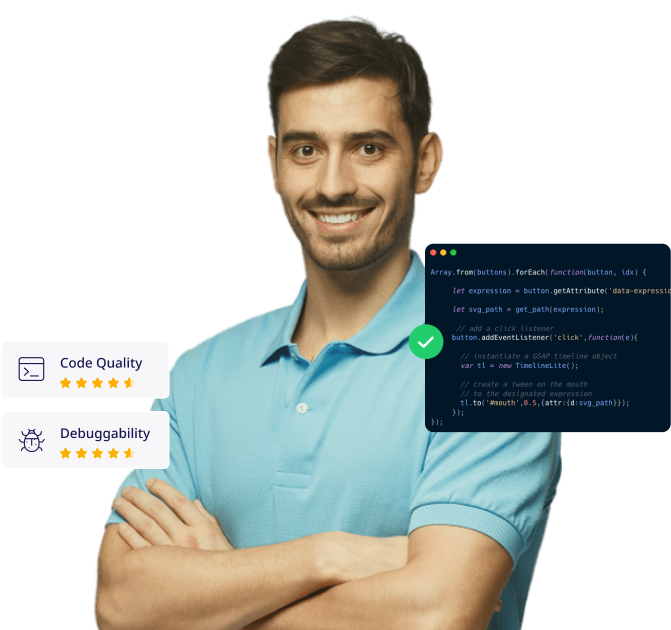Hire data science experts at ValueCoders. We address your data science challenges with expert talent, cost-effective solutions, and seamless integration. Focus on your core business while we deliver clear insights, secure data handling, and measurable results.

Our data scientists turn raw data into valuable insights, helping you make informed decisions and drive business growth. With expertise in advanced analytics, we ensure your data works for you.

Our data scientists are expert in collecting structured and unstructured data through web scraping and API integration. They use advanced techniques like feature engineering and data normalization to ensure the data is carefully prepared for model training.
Using a combination of manual techniques and cutting-edge tools like Hugging Face's datasets library, our data scientists label and categorize data. This enables machine learning algorithms to recognize patterns and make highly accurate predictions.
With expertise in exploratory data analysis (EDA) and hypothesis testing, our data scientists choose the most suitable ML algorithm for your project. They employ methods like Grid search and Bayesian optimization to fine-tune hyperparameters, ensuring optimal model efficiency.
Our data scientists employ various ML techniques, including supervised, unsupervised, and reinforcement learning, to train the model effectively. They validate the model using cross-validation, confusion matrix, and ROC curve analysis to guarantee accuracy.
Our data scientists for hire assess the model's performance using evaluation metrics post-deployment, such as precision, accuracy, recall, and F1 score. Any anomalies are promptly resolved, and underperforming segments are addressed to enhance overall performance.
Our data scientists for hire thoroughly analyze your business requirements and data. They unearth valuable insights and develop a comprehensive data-driven strategy, empowering you to make informed decisions and drive business growth effectively.
Ensure your machine learning models are seamlessly deployed and continuously monitored for performance, accuracy, and reliability; providing real-time insights and minimizing downtime.
Transform complex data into compelling visual narratives that drive decision-making, using advanced visualization techniques to communicate insights clearly and effectively to stakeholders.
Develop a comprehensive data strategy and roadmap that aligns with your business goals, ensuring data-driven decision-making and a clear path to achieving your long-term objectives.
Start your 7-day trial today and discover the perfect fit for your project needs.
Our data scientists stay updated about the latest trends and technologies. Here are some of the tech stacks they can work on:

Hire our skilled developers and lead the way to innovation.
At the core of our development process, we prioritize code quality, implementing stringent testing, detailed reviews, and industry-best practices to deliver software that excels in both functionality and longevity.

Finding top-tier data science talent can be a challenge. At ValueCoders, we connect you with pre-vetted experts who possess an average of 5 years of hands-on experience. Our data scientists excel at handling complex data, from unstructured sources to building sophisticated, data-driven solutions.
Let ValueCoders be your trusted partner in exploring the power of data. We offer flexible contracts, transparent pricing, and a commitment to intellectual property protection.
From startups to big enterprises, development
From startups to big enterprises, development
From startups to big enterprises, development
From startups to big enterprises, development
From startups to big enterprises, development
From startups to big enterprises, development
From startups to big enterprises, development
From startups to big enterprises, development
Ready to elevate your software projects? Hire our expert developers and experience unparalleled innovation and efficiency.
To hire data scientists for your project needs, you have three options that can be considered: an in-house team, hiring freelancers, or partnering with a trusted software development company like ValueCoders. Let's compare these three hiring models.
With a five-step hiring process in place, we are committed to onboarding
exceptionally productive engineers.

Take a look at the simple and straightforward process to hire software developers from ValueCoders.
We assess project alignment for potential collaboration.
We select developers from our tech pool as per project needs.
Upon ETA approval, developers start with direct task assignment.
Modify team size as needed, aided by an account manager.
Hire a team of data scientist developers from ValueCoders to provide top-notch development and excellent customer service.
Start your 7-day trial today and discover the perfect fit for your project needs.
When you hire expert data scientists, they take care of the following:
Data Collection and Preprocessing: Data scientists gather and clean data from various sources.
Data Exploration and Visualization: They explore datasets to identify patterns, trends, and anomalies. Visualization techniques present complex data clearly and understandably.
Model Development: Data scientists design and develop machine learning models to solve specific business problems, such as predictive analytics, recommendation systems, or fraud detection.
Model Training and Testing: When you hire data scientists, they train ML models on historical data and evaluate their performance using validation techniques to ensure they provide accurate predictions.
Model Deployment and Integration: Data scientists collaborate with engineers to deploy models into production environments, making them accessible for real-time use.
Continuous Monitoring and Maintenance: They continuously monitor model performance and update them.
Data Security and Ethics: Data scientists uphold data privacy and security standards, adhering to ethical guidelines in handling sensitive information.
Collaboration and Communication: They collaborate with cross-functional teams, including business stakeholders, to understand requirements and communicate insights effectively.
Hiring a data scientist can contribute to the business growth by helping you with:
Informed Decision-Making: Data scientists analyze data to provide valuable insights that support data-driven decision-making.
Enhanced Efficiency and Productivity: Data scientists help businesses operate more efficiently and boost productivity by automating processes and optimizing workflows.
Customer Understanding and Personalization: They analyze customer behavior and preferences, enabling businesses to deliver personalized experiences.
Risk Management: Data scientists assist in identifying potential risks and fraud through advanced analytics, helping businesses mitigate losses.
Innovation and Competitive Advantage: Data scientists drive innovation and help businesses gain a competitive edge by staying ahead of market trends.
Revenue Generation: Data scientists develop predictive models forecasting customer demands, enabling businesses to tailor products and services.
Resource Optimization: Data scientists help businesses optimize resource allocation by analyzing data, leading to cost savings and improved operational efficiency.
Hire remote data scientists capable of using data to extract actionable insights, leading to business growth, improved decision-making, and a competitive advantage in the market.
When hiring a data scientist, consider looking for the following qualifications and skillsets:
Education: A solid educational background in fields like computer science, data science, statistics, mathematics, or related disciplines is essential.
Programming Proficiency: Expertise in programming languages like Python or R, as well as knowledge of SQL for data querying and manipulation.
Statistical Knowledge: Solid understanding of statistical concepts and methodologies, such as hypothesis testing, regression analysis, and probability.
Machine Learning: Experience in applying ML techniques, including supervised and unsupervised learning, and knowledge of popular libraries like scikit-learn or TensorFlow.
Data Visualization: Proficiency in data visualization tools like Matplotlib, Seaborn, or Tableau to present insights that are visually compelling and easily understandable.
Data Manipulation: Skills in handling and preprocessing large datasets using tools like Pandas or NumPy.
Problem-Solving: Strong analytical and problem-solving skills to tackle complex business challenges and devise innovative data-driven solutions.
Domain Expertise: Familiarity with the specific domain or industry relevant to your business can be valuable, as it helps data scientists better understand the context and requirements.
Communication: Effective communication skills are crucial, as data scientists must be able to present their findings and insights to both technical and non-technical stakeholders.
Curiosity and Continuous Learning: A genuine curiosity to explore data and a willingness to stay updated with the latest advancements in data science and machine learning.
Business Acumen: The ability to understand the business goals and align data science efforts to drive positive outcomes for the organization.
Team Player: Collaboration is essential, so a data scientist should be able to work well in cross-functional teams with engineers, analysts, and business stakeholders.
Experimentation and Iteration: A data scientist should be comfortable experimenting with different models, iterating, and optimizing to achieve the best results.
Ethics and Data Privacy: Awareness of ethical considerations regarding data privacy, confidentiality, and responsible data usage.
Portfolio and Projects: Reviewing their portfolio, past projects, or Kaggle competitions can provide insight into their practical skills and problem-solving approach.
Find a data scientist who will effectively contribute to your organization’s data-driven success by assessing candidates based on the qualifications and skills mentioned above.
Data Scientists, Data Analysts, and Data Engineers have distinct roles within the data-related domain, each with its own focus and responsibilities:
Data Scientists:
Data scientists primarily focus on extracting valuable insights and knowledge from data. They possess a strong background in statistics, mathematics, and machine learning. Their main tasks include data exploration, predictive modeling, building machine learning algorithms, and deriving actionable insights from data to solve complex business problems. They are skilled in developing and training AI models to make data-driven predictions and decisions.
Data Analysts:
Data analysts are responsible for interpreting and analyzing data to support business decision-making. They understand data visualization and reporting tools well and are proficient in SQL and data querying. Their primary tasks involve data cleaning, aggregation, and generating reports and dashboards to present key performance indicators and trends. Data analysts focus on concluding data to facilitate operational and strategic decision-making.
Data Engineers:
Data engineers design and construct the infrastructure and architecture required to manage and process large volumes of data. They are skilled in database management, data warehousing, and ETL (Extract, Transform, Load) processes. Data engineers build and maintain data pipelines that collect, transform, and store data in a format suitable for data scientists’ and analysts’ analysis. Their role is essential in ensuring data accessibility, reliability, and scalability.
Data scientists utilize advanced statistical and machine-learning techniques to derive insights and build predictive models. Data analysts concentrate on interpreting data and providing reports to aid decision-making. Data engineers create and maintain the data storage and processing infrastructure.
While these roles may have overlapping skills, each one of these plays a unique and complementary part in the data lifecycle, ultimately contributing to the effective use of data in an organization.
To keep data scientists’ skills sharp and up-to-date, companies should provide the following ongoing professional development opportunities:
Training Programs: Companies can organize regular training programs, workshops, and webinars focusing on the latest advancements in data science, machine learning, and related technologies.
Access to Online Courses: Offering access to online learning platforms like Coursera, Udacity, or DataCamp allows data scientists to explore specialized courses and certifications to enhance their knowledge.
Data Science Conferences: Encourage data scientists to attend industry conferences and seminars to learn from experts, network, and gain insights into emerging trends.
Hackathons and Competitions: Organizing internal or external data science hackathons and competitions fosters healthy competition and encourages data scientists to tackle real-world challenges.
Research and Publication Support: Support data scientists in conducting research and publishing their findings in industry journals or conferences to share knowledge and gain recognition.
Data Science Communities: Encourage participation in data science communities and forums where data scientists can exchange ideas, share experiences, and learn from peers.
Cross-Functional Projects: Involve data scientists in cross-functional projects with other teams (e.g., marketing, product development) to gain exposure to different domains and challenges.
Data Engineering Collaboration: Provide opportunities for data scientists to collaborate with data engineers to understand the data infrastructure and improve their understanding of data pipelines.
Access to Research Papers and Journals: Companies can subscribe to relevant research journals and publications, giving data scientists access to the latest research papers and findings.
Industry Certifications: Support data scientists in obtaining industry-recognized certifications to validate their skills and knowledge in specific domains or technologies.
Time for Self-Study: Allow data scientists to dedicate some time during work hours to study and explore new tools and technologies.
Internal Knowledge-Sharing Sessions: Organize regular internal knowledge-sharing sessions where data scientists can present their work, share insights, and receive peer feedback.
Performance Reviews with Learning Goals: Incorporate learning and skill development goals into data scientists’ performance evaluations, encouraging a growth mindset.
By providing these ongoing professional development opportunities, companies can ensure that their data scientists stay ahead of the latest advancements, remain motivated, and contribute effectively to the organization’s success.
Integrating data scientists into existing teams can present several challenges. Here are some potential challenges and strategies to address them:
Communication and Collaboration:
Challenge: Data scientists may have specialized technical knowledge that other team members might not fully understand, leading to communication gaps and challenges in collaboration.
Solution: Encourage regular meetings and open communication channels to foster understanding between data scientists and other team members. Facilitate knowledge-sharing sessions to bridge the gap and encourage cross-functional collaboration.
Aligning Objectives:
Challenge: Data scientists’ objectives might not align with the broader goals of the existing team, leading to conflicting priorities.
Solution: Clearly communicate the team’s overall objectives and how data scientists’ contributions align with them. Involve data scientists in setting team goals to ensure alignment and a shared sense of purpose.
Data Access and Infrastructure:
Challenge: Data scientists may face difficulties in accessing the necessary data or working with outdated infrastructure, hampering their productivity.
Solution: Ensure data scientists have access to relevant data and resources. Collaborate with data engineering teams to improve data pipelines and infrastructure to support data scientists’ needs.
Resistance to Change:
Challenge: Existing team members may be resistant to adopting new data-driven approaches or may feel threatened by the introduction of data scientists.
Solution: Provide training and workshops for the entire team to familiarize them with data science concepts and the benefits of data-driven decision-making. Emphasize the collaborative nature of data science integration and celebrate successful joint projects.
Unrealistic Expectations:
Challenge: Unrealistic expectations about the immediate impact of data science projects can lead to disappointment and frustration.
Solution: Set realistic expectations and timelines for data science initiatives. Educate stakeholders about the iterative nature of data science projects and the time required to produce meaningful results.
Data Privacy and Ethics:
Challenge: Data scientists must adhere to ethical considerations and data privacy regulations, which may require adjustments to existing data practices.
Solution: Provide data scientists with clear guidelines on data privacy and ethics. Involve legal and compliance teams to ensure data practices align with relevant regulations.
Talent Retention:
Challenge: Attracting and retaining skilled data scientists can be challenging due to the high demand in the job market.
Solution: Offer competitive compensation packages, opportunities for professional growth, and a supportive work environment to attract and retain top data science talent. Implement mentorship programs to provide career development and growth opportunities.
Measuring Success:
Challenge: Measuring the impact and success of data science initiatives may be challenging, especially in the early stages.
Solution: Establish key performance indicators (KPIs) and success metrics for data science projects. Regularly evaluate and communicate the progress and impact of data science initiatives to stakeholders.
By addressing these challenges proactively and promoting a culture of collaboration and data-driven decision-making, companies can successfully integrate data scientists into existing teams and harness their expertise for organizational growth and success.
Ans. You should choose ValueCoders to hire expert data scientists for the following reasons:
Ans.ValueCoders’ data scientists have successfully transformed industries across multiple sectors, including:
Ans.ValueCoders’ data scientists ensure data privacy and security through:
Ans. Our data scientists turn raw data into actionable insights through:
Ans. Businesses of all sizes and industries, including eCommerce, healthcare, finance, manufacturing, and more, can benefit from our data scientists’ expertise in exploring valuable insights and driving data-driven decision-making.
Ans. Our team can work with multiple types of data, including structured, semi-structured, and unstructured data from diverse sources such as databases, spreadsheets, social media, IoT devices, and more.
Ans. Our pricing structure is flexible and tailored to your specific project requirements. We offer hourly rates, fixed-price models, and dedicated team engagements to ensure you get the best value for your investment.
Ans. We use clear visualizations, concise reports, and storytelling techniques to make complex data insights accessible. Our team ensures that findings are presented in an understandable and actionable manner for non-technical stakeholders.
We are grateful for our clients’ trust in us, and we take great pride in delivering quality solutions that exceed their expectations. Here is what some of them have to say about us:

Co-founder, Miracle Choice

Executive Director

Director

Director
We offer a 2 weeks risk-free trial for you to try out the resource(s) before onboarding. After 2 weeks, if you like the resource(s), you pay for the time and continue on. Else, we replace the aligned resource(s) or cancel the trial as per your wish.
Simple, transparent and easy - isn't it?
Start my 2 week risk-free trial now!Trusted by Startups and Fortune 500 companies
We can handle projects of all complexities.
Startups to Fortune 500, we have worked with all.
Top 1% industry talent to ensure your digital success.



Let's discuss how we can bring your vision to life.